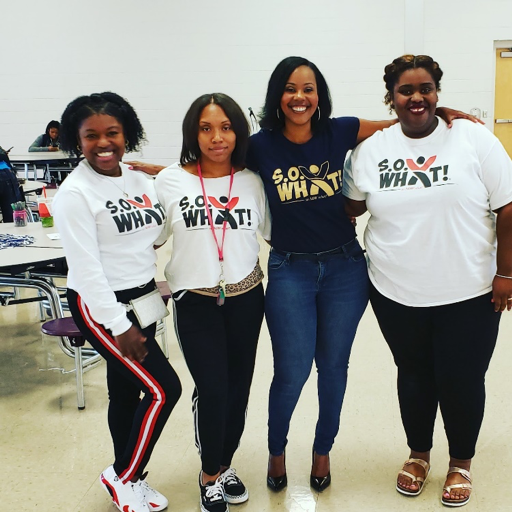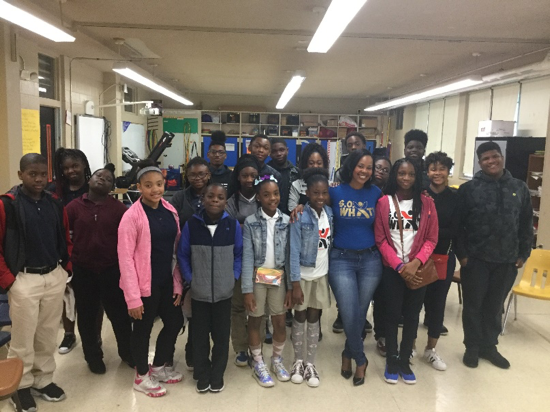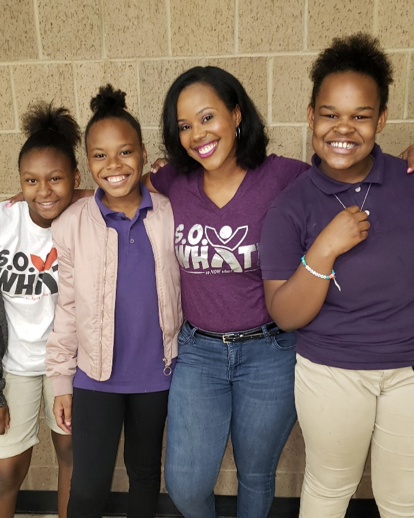Life Skills for Students to Succeed
Why are life skills important for students?
One of the greatest honors of my life has been using my story as a teen mom to teach life skills (as well as literacy and character education) to students through the S.O. What! Literacy, Life Skills, and Character Educuation curriculum. Life skills for students are a set of skills which help students make it in life In today’s dynamic world, students need all the help they can get to help them grow, learn, and simply cope. Change can be unsettling. A single event in someone’s life can change the direction their life is taking. Teaching life skills is one way to give students the tools they need to handle life’s curveballs and thrive under all life circumstances.
When we talk about teaching life skills, we have some basic essential life skills in mind.
These are collaboration, communication, critical thinking, resilience, problem-solving, creativity, decision making, personal management and time management. And looking at each skill, we note some skills are more relevant in some stages in a student’s life. The combination of skills may change, but each skill is essential.
According to British Council Greece, life skills touch upon issues that are:
- topical
- real: they actually affect people’s lives
- sometimes sensitive: they can affect people on a personal level, especially when family or friends are involved
- often controversial: people disagree and hold strong opinions about them
- ultimately moral: they relate to what people think is right or wrong, good, or bad, important or unimportant in society.

Let’s examine why life skills are important for students. The development of basic essential life skills helps students to:
-
Survive and Thrive in the world
In a rapidly evolving world, students need skills to keep them rooted. Skills which will enable them to withstand the uncertainties and upheavals of life today. The ability to survive and thrive is what students get from studying and acquiring life skills.
According to Macmillan Education, “In a constantly changing environment, having life skills is an essential part of being able to meet the challenges of everyday life. The dramatic changes in global economies over the past five years have been matched with the transformation in technology and these are all impacting on education, the workplace, and our home life.”

-
Build confidence in public speaking and communication
Communication is a core skill students need at home, in school and beyond. Through life skills students get a confidence boost in addition to developing their ability to communicate with teachers, family, and friends. In later years, public speaking is a useful skill in college, in the workplace and in the community.
-
Develop a mindset of possibility
Life skills help students think creatively as they find solutions to problems they may be facing in school, at home, and in the community. A closed mind can’t see much beyond what is in front of them. However, an open mind can dream up anything, do anything and be anything.
-
Make sound, grounded decisions
Decisions are part of life. The decision can be as simple as what to eat for breakfast to something as complex as which scholarship to accept. Decision-making as a life skill will guide a student towards making sound, well-reasoned decisions.

-
Develop self-awareness
The best gift someone can give themselves, is the gift of self-awareness. When you understand your strengths, weaknesses, knowledge, skills, and attributes, you can quickly figure out the best place for you in the world. Life skills open the door to explore this path. And a journey of self-discovery reveals many hidden gems about you.
-
Nurture the future generation of innovators and problem solvers
Many inventions were borne out of curiosity. The inventors often asked themselves what would happen if they did X. Then they would try different variations of X until they achieved the result they were looking for. If not for their curious, innovative minds, we might still be using candlelight to power our homes, cooking over open fires and only washing our clothes by hand. Life skills nurture the future generation of innovators and problem solvers.
-
Live responsibly
Life skills are important so that students live responsibly where they make positive contributions to everyone around them. Students are able to exercise moderation and self-control in whatever they do. They can be counted upon to do the right things, under any circumstance. Or as Martin Luther King, Jr. said, “the time is always right to do what is right”.
-
Develop employability skills such as collaboration, communication, problem-solving
Employment is a desired outcome for many students, This requires they develop employability skills to guide them towards what a potential employer is looking for. Forbes listed 12 qualities employers look for when hiring. Every quality the employer is looking for links to an essential life skill.
Spencer Kagan, a well-known author and speaker in the education and psychology fields argues that the demand for life skills is up. He goes on to say, “Increased technology in the workplace is associated with interdependence — no one person working alone can design a computer. Teams cooperate with other teams. In today’s world teamwork skills are employability skills”.
Employability skills are vital for workplace success. Successful employees:
- Understand the power of teamwork and collaboration
- Have mastery over written, verbal, and non-verbal communication
- Maintain a problem-solving approach to life
- Know who they are, and contribute meaningfully to a common goal
- Take responsibility for their thoughts and actions
- Are reliable, creative thinkers who find new ways to work
- Work well independently
-
Prepare for the future of work
One thing students quickly realize when they transition into employment, the world of work is very different from life in school. Yes, the education system is designed to increase independence and autonomy the higher up one goes. But if students are not equipped with the basic essential life skills, they may miss the preparation all together. The end result – they show up at work completely unprepared to cope with the changes, demands and expectations from their employer. Life skills are important as they help prepare students for the rigors of a work life where application of all the basic essential life skills is par for the course.
-
Champion leadership
All leadership start with you. A student must know how to lead and manage self before they can do the same for others. That makes life skills important to students. It puts tools of self-leadership and management in their hands. Life skills champion leadership. At the heart of every essential life skill is the element of taking personal ownership and responsibility. It involves putting others first, building trust, showing care and inspiring action. All those are elements of leadership.
-
Develop grit and resilience
Let’s face it, life is not a straight line from start to finish. And when the unexpected happens, you need coping skills. You need to be able to pull yourself up and proclaim you are not defeated. You are still in the game, and you will keep going. Grit and resilience are two reasons why life skills are important to students.
-
Practice agility and adaptability
When things aren’t going according to plan, you have one of two options. You can either adapt or succumb. Adapting means finding a way to make things work in new circumstances. Life skills are important to students as they promote the practice of adaptability and agility. Where agility means adapting fast.
-
Holistic development
There are different levels of development a student undergoes. The obvious one is physical development, which is a natural progression. A student also develops cognitively by increasing their knowledge. They develop socially through interactions with others. Nothing brings it all together like life skills. Life skills are important for students to develop holistically.
-
Confidence to deal with emerging life and school issues
Bullying, cyberbullying, and discrimination are real issues affecting many students. The bully and the bullied can benefit from getting life skills. The bully can understand bullying as a form of aggression which is unacceptable in society, and the bullied can demonstrate assertiveness and open lines of communication. Life skills help students express themselves in healthy ways.
-
A voice to speak up about issues concerning them and speak out against issues in society
There are many things going wrong in the world. At the same time, there are many things going right. But it’s the wrongs of the world we need to right. Life skills give students a voice to speak about issues concerning them. Using life skills also
-
Contributing in society and to society
Citizenship as an element of life skills emphasizes the personal responsibility for all members of society. A student learns how to make a contribution in society by being involved in community activities. At the same time, self-awareness enables a student to contribute directly to society by using their knowledge, skills and talents for the common good.
-
Respecting diversity and practice inclusion
The world is made up of diverse groups of people. Life skills can help students appreciate differences and promote collaborations within these diverse groups. The social and cultural awareness gained through learning life skills can support students in practicing inclusion at school, and in the community.
Want to see how the S.O. What! Literacy, Life Skills, and Character Education curriculum can help teach important life skills to your students? Let’s talk!
______________________________________________________________________________________________________
I’m Summer Owens, and my passion is helping youth and young adults realize success no matter what obstacles they face. As an international resilience and leadership keynote speaker, author, S.O. What! Success Coach, and creator of the S.O. What! Literacy, Life Skills, and Character Education curriculum, I empower people to say, “So what!” to even their greatest challenges. provide a framework to help people see past their challenges and focus on solutions using the S.O. What! Success System (Overcome Obstacles + Eliminate Excuses + Calculate Choices = S.O. What! Success). Through keynotes, workshops, books, online courses, and workbooks, I use life’s challenges and my own story of resilience as a rape survivor and teen mom success story to help others confidently pursue their dreams.
Looking for an inspiring college motivational speaker? A high school literacy curriculum? A middle school life skills workbook? A great example for teen mothers? A women’s empowerment or single mother’s conference speaker? I’m your girl and will help any audience say, “S.O. What!”.









